 Petzlover
PetzloverAsian is originated from United Kingdom but Turkish Angora is originated from Turkey. Both Asian and Turkish Angora are having almost same weight. Both Asian and Turkish Angora has same life span. Both Asian and Turkish Angora has same litter size. Asian requires Low Maintenance. But Turkish Angora requires Moderate Maintenance
Known also as the Malayan, the Asian cat is likened to the Burmese but just with different coat patterns and colors.
This particular cat breed was developed in 1981 in the UK. Apparently there was a mistake mating between a Lilac Burmese and a Chinchilla Persian and kittens from these were born in 1981.
So beautiful were they that a breeding program started with new coat colors and patterns. The breed got the name ‘Asian’ with all the varieties reaching GCCF Championship status.
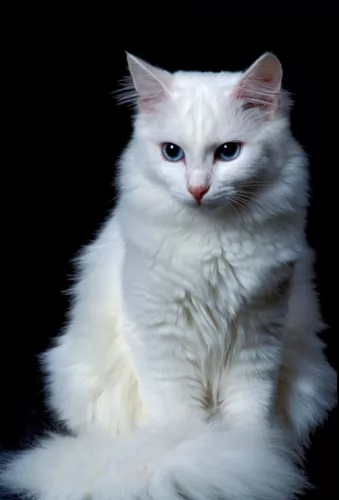 The Turkish Angora is a very old breed that naturally developed. It is thought that the breed developed in Turkey in the Ankara region formerly known as Angora.
The Turkish Angora is a very old breed that naturally developed. It is thought that the breed developed in Turkey in the Ankara region formerly known as Angora.
There are records that indicate that the Turkish Angora made an appearance in the UK as early as the 14th century already. Also, the beautiful longhaired cat was also introduced to the United States.
A breeding program was started for these cats in the early 20th century and it was then taken to Canada in 1963 and accepted as a championship breed.
While white was the only acceptable color at first, they now come in many different colors.
The Asian cat is medium-sized and muscular. The male cat is somewhat bigger than the female and weighs roughly 5 – 7kg while the female will weigh roughly 3 – 5kg although most times, there is not much difference in size between the males and females.
The attractive cat has a round head and wide-spaced ears with large green eyes. It’s a slender cat, but athletic with slender legs and medium thickness tail. Asian cats come in a wide range of colors such as fawn, chocolate, black, blue, cinnamon. The coat is short, fine, and silky and the Asian doesn’t require too much grooming.
These are friendly, playful cats and they get on well with children if the children are kind, gentle and respectful with him. This is a fairly dependant cat and he will actually follow his favorite human being, crying out for attention.
The Asian is a social cat and can fit well into different homes. However, because it is a social cat, they require an owner that is willing to spend time with them. They’re cats that are sensitive to the moods of their owners and make excellent companions.
They’re adventurous cats and enjoy exploring and traveling, voicing their opinion on different things as well. The Asian thrives on the attention it gets from their human owners. It’s a sociable cat and is quite talkative too.
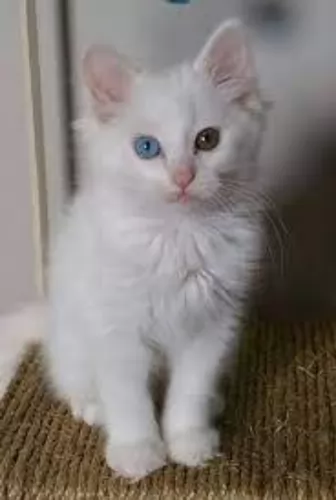 This is a medium-sized, muscular cat that can weigh between 3 and 6kg. It is a long-haired cat and the single coat has no undercoat.
This is a medium-sized, muscular cat that can weigh between 3 and 6kg. It is a long-haired cat and the single coat has no undercoat.
While the Turkish Angora is essentially white, its coat can come in a number of other colors.
The cat’s body if firm and fairly long, the legs are long with the hind legs being longer than the front legs, The tail is long and plumed, the head has large fairly pointed ears that can have tufts of fur. The eyes are large and almond-shaped and slant somewhat upwards. The color of the eyes can be blue, green, gold, amber.
This is a very active, athletic cat and he likes nothing more than to leap up on to high perches to survey his surroundings. They are intelligent, affectionate cats and they seem to gravitate towards one special human family member.
The cat is also protective of his human family. If any family member wants to stroke and pet them, they are absolutely delighted, just lapping up the attention.
They are smart enough to learn a few tricks too. They aren’t vocal cats but are sweet and quiet as well as being affectionate, making them perfect companions.
They don’t do well with changes, and a sudden change in his lifestyle can be upsetting for him.
The Asian cat is such a sweet animal – gentle and affectionate and also very sociable. They are also curious and intelligent and vocal enough to let you know their needs. They're strong-willed if they want something.
The Asian makes an excellent companion for singles, couples, families or the elderly. They also get on well with children and with other pets in the home.
There are quite a few Asian cat varieties and each one promises to make you an excellent companion.
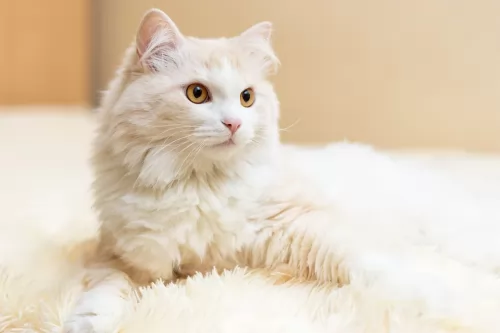 Beautiful to look at, this cat has got all the characteristics that make him a wonderful pet. He is playful well into adulthood and will love an assortment of stimulating toys to be amused by.
Beautiful to look at, this cat has got all the characteristics that make him a wonderful pet. He is playful well into adulthood and will love an assortment of stimulating toys to be amused by.
He is a sociable breed and doesn’t enjoy being left alone for hours. It would be far better to have another feline friend to keep him company.
Active and entertaining, you’ll be amused by your Turkish Angora and be so glad that you made the decision to bring such a charming creature into your home and heart.
Although there are no specific health issues with this cat, because of it being associated with the Burmese, it may be more susceptible to diabetes mellitus than other breeds.
There are many cats in modern times developing diabetes mellitus – where they are unable to produce enough insulin to balance blood sugar. If the disease goes untreated it can lead to dehydration, vomiting, depression, weight loss, and even death. Your cat will be thirsty and urinating more frequently. There are various treatments and the diet for the cat will need to change too.
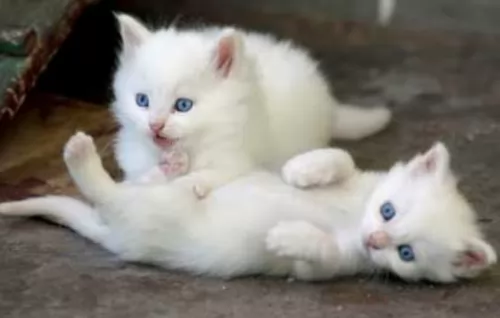 Turkish Angoras are generally healthy, but white cats with blue eyes can be prone to deafness. It is the W gene that is responsible for the white coat and blue eyes. Unfortunately, the presence of a blue eye can indicate deafness in the cat. But there are these cats that have 2 blue eyes and they have normal hearing.
Turkish Angoras are generally healthy, but white cats with blue eyes can be prone to deafness. It is the W gene that is responsible for the white coat and blue eyes. Unfortunately, the presence of a blue eye can indicate deafness in the cat. But there are these cats that have 2 blue eyes and they have normal hearing.
Another problem that has been seen in this beautiful cat breed is Ataxia which is a deadly neuromuscular disorder.
The most common sign of ataxia is an abnormal way of walking and the cat is actually unsteady on his feet. Sometimes the feet can even drag on the ground. Thankfully, screening has reduced the incidence of the disease.
Also, watch out for hypertrophic cardiomyopathy, a kind of heart disease that causes the heart muscle to enlarge.
Just remember that with a cat, diet can also play a huge role in the health of a cat. Your furry friend needs the right meaty foods with the right balance of nutrients to remain healthy and strong.
To take care of the cat’s shiny coat, you can gently brush your Asian every week, not more, as they are short-haired cats, they’re not heavy shedders and they are low maintenance.
Age and general health will influence the way you feed your Asian cat. You’ll want to be feeding your feline friend the very best food there is as this will contribute towards his good health.
If you opt to feed your cat a commercially manufactured cat food, higher protein levels in wet foods might be better for your carnivorous pet. You don’t want to provide your cat with a high protein diet that is deficient in amino acids.
That is why it is important to research cat foods and their ingredients and get to know what are the most important ingredients for your cat to be getting. At all costs, avoid your cat becoming obese.
Make sure your cat has access to fresh cool water to maintain his body temperature.
Check your cat’s teeth, as he can’t convey to you that he is in pain – you need to check inside his mouth. Redness inside his ears might be indicative of an ear infection.
Whenever your cat seems to be ill, get him to the vet.
Provide your cat with a litter box that is kept hygienically clean.
Provide your cat with food- and water bowl, a brush for grooming and warm, dry sleeping basket.
Have your Asian neutered or spayed to prevent unwanted kittens.
Make sure your cat’s vaccines are up to date.
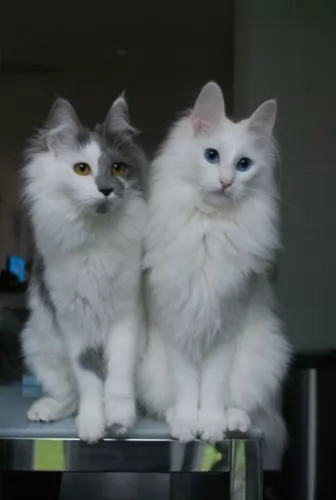 The Turkish Angora has a single coat and the lack of an undercoat makes it easy to brush him and keep the coat soft and silky. Also, the coat is only fully developed when the cat is about 2 years old.
The Turkish Angora has a single coat and the lack of an undercoat makes it easy to brush him and keep the coat soft and silky. Also, the coat is only fully developed when the cat is about 2 years old.
Check the inside of the ears. You may not want to clean them out yourself as you have to be very careful not to damage the ears. The vet and cat groomers can help you with this.
Keep your Turkish Angora’s litter box spotlessly clean. Cats are very particular about the cleanliness of their litter box and the feces will need to be removed every single day.